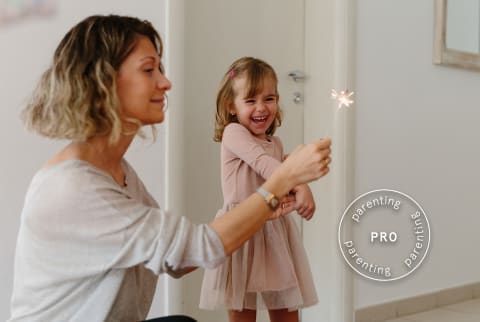Advertisement
4 Expert-Approved Tips For Setting New Year's Resolutions For The Entire Family


Resolutions are a time-honored tradition tangled up in the promise of change. As one year ends and another begins, New Year’s resolutions are in full swing. And while New Year’s resolutions are considered an adult thing to do, parents can include their kids in fun.
Ahead, psychotherapist Annette Nuñez, Ph.D., LMFT, offers parents some guidance on helping kids make New Year’s resolutions — and keeping them.
Why should parents encourage New Year’s resolutions with their kids?
When research shows that as much as 63% of adults never even bother to make resolutions, and only 11% follow through to keep their resolutions, encouraging three-year-olds to make New Year’s resolutions may seem nonsensical.
But Nuñez says parents should lean into the practice for one simple reason — “it teaches kids the importance of setting intentions and doing the work to achieve them. Moreover, it introduces the concept of responsibility and follow-through.”
Tips for helping your child keep their New Year’s resolutions
Expert-approved tips for setting intentions.
Make resolutions as a family
According to Nuñez, parents can help their kids stick with it by modeling the behavior and making resolutions as a family. And when making resolutions, she adds there’s no need to reinvent the wheel.
Family resolutions can look like:
- No phones at the dinner table
- Eating dinner at least once a week as a family
- Family game night once every other week
Keep it age-appropriate
Nuñez adds that resolutions are limited to older kids and teens. While parents will need to explain a bit more about the process (perhaps phrasing it as setting a goal), the little ones can most certainly participate.
“I would start as soon as your child starts to do things on their own, like brush their teeth and clean up their room,” she says. “For example, a good New Year’s resolution for a 3-year-old would be to put away their toys before bed or brush their teeth.”
The most important thing to keep in mind is that resolutions should align with your child’s age and ability.
Keep them attainable
To help kids follow through, Nuñez says resolutions should be age-appropriate and attainable.
The quickest way to failure is to establish an unrealistic goal. That goes for anyone at any age - kids included. So when you and your child are formulating your New Year’s resolutions, be sure to make them achievable.
Have a plan
Many people don’t think about it, but making a New Year’s resolution is only half the battle — more often than not, a good plan is just as important.
As an example, Nuñez says, “Eating healthy or eating more veggies is a popular one for little kids.” And while that’s a great resolution, parents often forget to establish a plan to help their kids make it happen.
In this case, actionable steps include:
- Having a smoothie every day after school
- Adding veggies to lunchboxes
New Year’s resolution ideas by age group
“Age plays a crucial role in establishing New Year’s resolutions,” says Nuñez. Parents should consider helping their child with resolutions based on age; here are some ideas.
New Year’s resolution ideas for preschoolers
- Clean up toys by putting them where they belong
- Brush my teeth twice a day
- Try new foods and give every veggie a chance
- Learn all the names of the kids in my class
New Year’s resolution ideas for kids (5 to 12 years old)
- Find a physical activity or a sport I like and do it at least three times a week
- Be friendly to kids who may have a tough time making friends. Talk to them and invite them to join activities
- Follow the house rules for gaming and internet use
- Read at least one book a month
New Year’s resolution ideas for teens (13 years old and older)
- Limit my internet and online activities to two hours each day
- Read at least two books a month
- Give some of my time to help others by volunteering in the community
- Engage in more physical activities











